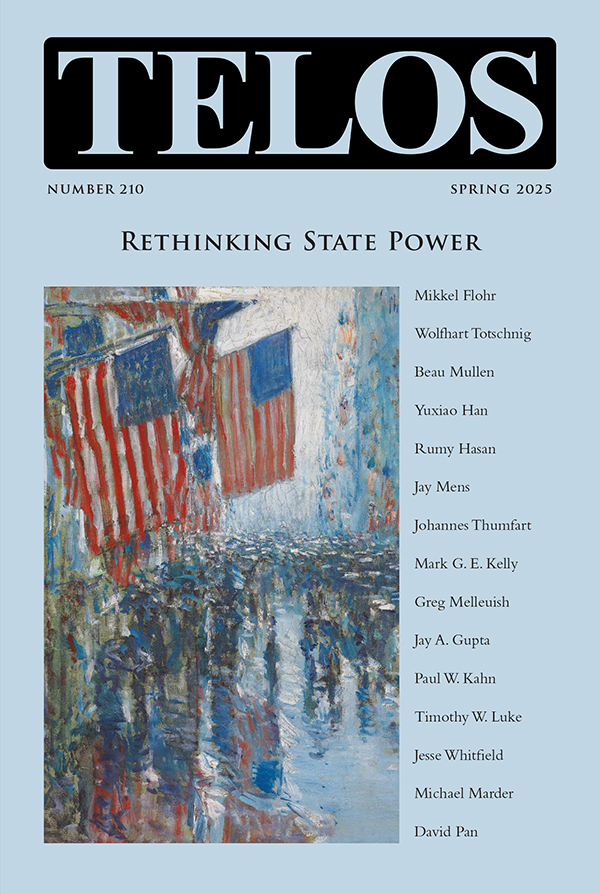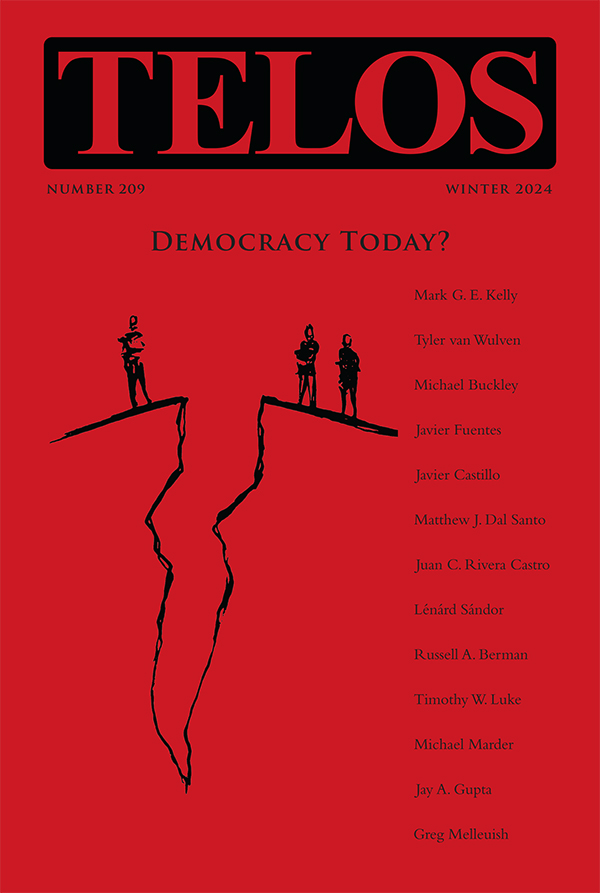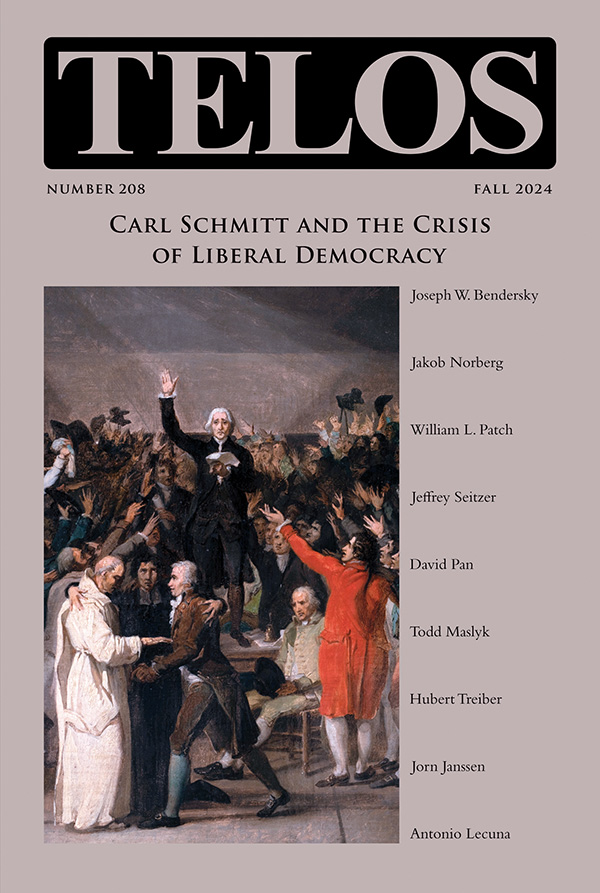By David Pan · Monday, March 24, 2025 Telos 210 (Spring 2025): Rethinking State Power is now available for purchase in our store. Individual subscriptions to Telos are also available in both print and online formats.
 Frustrating the hopes of cosmopolitans and globalists, state power is back. Rather than imagining a replacement of sovereignty with law, political debates now revolve around the particular forms that state sovereignty might take. Even Europe, long seeing itself as the place from which a new international legal order might expand its reach, is reinvesting in military power to protect its sovereignty from the threats posed by Russia, China, and, in some ways, the United States. Yet this realization about the continuing centrality of the state does not mean an abandonment of the moral imperatives and prejudices of the people. On the contrary, state power is being recognized as the instrument through which the people can exercise their will, even as the state places constraints on popular sovereignty. The essays in this issue of Telos consider the ways in which state power interacts with popular attitudes and social institutions in order to establish the basis for sovereignty and law. Frustrating the hopes of cosmopolitans and globalists, state power is back. Rather than imagining a replacement of sovereignty with law, political debates now revolve around the particular forms that state sovereignty might take. Even Europe, long seeing itself as the place from which a new international legal order might expand its reach, is reinvesting in military power to protect its sovereignty from the threats posed by Russia, China, and, in some ways, the United States. Yet this realization about the continuing centrality of the state does not mean an abandonment of the moral imperatives and prejudices of the people. On the contrary, state power is being recognized as the instrument through which the people can exercise their will, even as the state places constraints on popular sovereignty. The essays in this issue of Telos consider the ways in which state power interacts with popular attitudes and social institutions in order to establish the basis for sovereignty and law.
Continue reading →
By David Pan · Monday, January 6, 2025 Telos 209 (Winter 2024): Democracy Today? is now available for purchase in our store. Individual subscriptions to Telos are also available in both print and online formats.
 Since the supposed triumph of liberal democracy with the end of the Cold War, democracy seems now to be in retreat. The hung parliaments in France and Germany, reminiscent of the divides of Germany’s Weimar Republic; the just-in-time reversal of the declaration of martial law in South Korea; the increasing authoritarianism of China, Iran, and Russia; and the deterioration of democratic norms in the United States are all indications that the liberal democratic end of history was a chimera. Since the supposed triumph of liberal democracy with the end of the Cold War, democracy seems now to be in retreat. The hung parliaments in France and Germany, reminiscent of the divides of Germany’s Weimar Republic; the just-in-time reversal of the declaration of martial law in South Korea; the increasing authoritarianism of China, Iran, and Russia; and the deterioration of democratic norms in the United States are all indications that the liberal democratic end of history was a chimera.
What is the situation of democracy today? Are the present problems simply growing pains in the inevitable march of history, or are there fundamental limitations of this political form? Is democracy a stable form of government or a delicate balancing act that will always be at risk of deteriorating and being replaced by some form of authoritarianism?
These current indications of the precarity of democracy also coincide, however, with an intense concern for its future. Never has there been such a focus on democracy as a political goal. During the Cold War, the United States, more concerned about promoting capitalism than defending democracy, supported capitalist authoritarianism in places such as Chile, South Korea, and Taiwan. But as it turned out, capitalism did not really need such political backing. In the Cold War between capitalism and communism, the latter lost based on its inability to produce economic growth. Insofar as communism’s undermining of private property and market mechanisms proved to be economically catastrophic, even nominally communist governments in China and Vietnam have since voluntarily embraced capitalist economic policies. Aside from U.S. college campuses, the only diehard Marxists left are in Cuba, North Korea, and Venezuela, all of whose governments are presiding over the immiseration of their peoples.
While it was the Soviet Union, and not capitalism, that collapsed under the weight of its own contradictions, the general recognition of these contradictions meant that communism could only maintain itself by using repressive methods. Communism has been one of the surest ways of moving toward and cementing authoritarianism and totalitarianism. By contrast, capitalist authoritarianism has sometimes led to democratic reforms, and we can point again to Chile, South Korea, and Taiwan, but also to the countries of Eastern Europe, as successful transitioners to democracy within a capitalist framework. Unfortunately, while communism might correlate strongly with authoritarianism, the link between capitalism and democracy does not seem to be so tight.
Continue reading →
By David Pan · Friday, October 18, 2024 Telos 208 (Fall 2024): Carl Schmitt and the Crisis of Liberal Democracy is now available for purchase in our store. Individual subscriptions to Telos are also available in both print and online formats.
 It hardly needs mentioning that liberal democracy is facing a number of threats today, both internal and external. Even if the political parties in the United States cannot agree on the main source of the threats, they both believe that democracy is in danger. Democrats point to the January 6 Capitol riot and Trump’s role in it as examples of the way in which liberal democratic procedures are being directly attacked. Republicans point to the Democratic-backed court cases against Trump as well as the FBI’s favoritism toward Democrats in their public announcements before elections as evidence that the legal system and the administrative state are being used to shut out political opponents. Both parties point to violations of free speech rights at college campuses, yet they also both seek to establish limits to those rights in defense of liberal democratic values. It hardly needs mentioning that liberal democracy is facing a number of threats today, both internal and external. Even if the political parties in the United States cannot agree on the main source of the threats, they both believe that democracy is in danger. Democrats point to the January 6 Capitol riot and Trump’s role in it as examples of the way in which liberal democratic procedures are being directly attacked. Republicans point to the Democratic-backed court cases against Trump as well as the FBI’s favoritism toward Democrats in their public announcements before elections as evidence that the legal system and the administrative state are being used to shut out political opponents. Both parties point to violations of free speech rights at college campuses, yet they also both seek to establish limits to those rights in defense of liberal democratic values.
Meanwhile, authoritarian governments in places such as China, Russia, Iran, and North Korea have becoming increasingly aggressive in opposing liberal democracies as threats to their own legitimacy. In doing so, they have attempted to provide theoretical justifications for their authoritarian rule that are based in anti-Western and anti-colonial discourses that align with critiques of the West advanced by left-leaning academics in liberal democracies.
Because they are based on freedom of expression and freedom of conscience, liberal democracies must allow open public spheres whose dynamics could take unforeseen directions that end up undermining the cultural and procedural foundations of liberal democratic governance. While the American Revolution provides the best example of the success of liberal democracy, the French Revolution and the Weimar Republic demonstrate spectacular failures. Outside of the West, the contrast between Taiwan and China and between Indonesian democracy and the Iranian Revolution indicate that we can find the same contrasts between failure and success in East Asia and in the Islamic world.
Continue reading →
By Andrei S. Markovits · Monday, April 29, 2024 The following essay is part of a special series of responses to recent events centered, for now, at Columbia University, and extending beyond its confines to include the wider array of societal problems that the disorder there symptomatizes. For details, see Gabriel Noah Brahm, “From Palestine Avenue to Morningside Heights.”—Gabriel Noah Brahm, Director of the Telos-Paul Piccone Institute’s Israel initiative The following text is an expanded English-language version of the German article “Palestine Avenue,” published in Konkret 2/24, pp. 38–39.
 I remember it well. It was in the spring of 1987 when I commenced my lecture in Osnabrück on the German left with these remarks: “So that we understand each other: Regardless of my heavy criticisms and profound objections to many facets of its current affairs, I fully accept the existence of the Federal Republic of Germany and do not want its destruction!” People looked at me as if I had lost my mind! I remember it well. It was in the spring of 1987 when I commenced my lecture in Osnabrück on the German left with these remarks: “So that we understand each other: Regardless of my heavy criticisms and profound objections to many facets of its current affairs, I fully accept the existence of the Federal Republic of Germany and do not want its destruction!” People looked at me as if I had lost my mind!
But I said: “Such a fundamental statement of situating the speaker’s normative orientation is de rigueur at the beginning of every discussion involving anything relating to Israeli politics, society, and culture. The very existence of the country has simply never been accepted as a matter of course. Thus, it must be affirmed in every case.” Nothing has changed in the ensuing forty years. None of the 193 UN members must experience this every day in the most varied discussions all over the world, be it about their politics or society, culture or food, language or habits. None of these items are legitimate in Israel’s case. Just witness the bitter conflicts involving “inauthentic” Israeli food and its alleged appropriation of “authentic” Palestinian food, conveniently forgetting that all foods everywhere are appropriations and amalgams of various cultures. The more appropriation, the better, I would argue. Look at how much better food in Germany has become by appropriating Italian, Turkish, and Greek food.
Following violent conflicts, hostile neighbors may not accept each other’s post-conflict existence for a while, but none have had the temporal length (seventy-five years and counting) or the spatial dimension (reaching across the globe, far from the respective country’s borders) that pertains in the case of Israel. Serbia may not accept the existence of Kosovo, nor Georgia that of Abkhazia, but either’s alleged nonexistence does not matter in a discussion about them in Nigeria or Thailand. What makes the Israeli situation so unique is that this ubiquitous unacceptance exists in all corners of the globe and among the most varied publics. Making it more pernicious still is that this unacceptance is perhaps more prominent in spaces of civil society than in those of governments. Even in the case of apartheid-ruled South Africa from the 1960s to the 1990s (with which Israel is always associated), it was South Africa’s apartheid regime that was anathema, not the country’s existence per se. One did not have to begin any discussion about South African apartheid by stating that one did not desire the destruction of South Africa as a country.
Continue reading →
On today’s episode of the Telos-Paul Piccone Institute podcast, TPPI’s Mark G. E. Kelly, organizer of the 2024 Telos conference on “Democracy Today?,” speaks with Salvator Babones of the University of Sydney about democracy in India, asking him in particular about his sympathetic reading of the Bharatiya Janata Party (BJP) of Prime Minister Narendra Modi. The podcast is available in both video and audio-only formats.
Continue reading →
By Telos Press · Monday, August 29, 2022 Forthcoming in Educational Philosophy and Theory is a collection of reviews of Timothy W. Luke’s recent book The Travails of Trumpification, published by Telos Press Publishing. Excerpts from the reviews appear below, and the full set of reviews can be read here (subscription required). Save 20% on the paperback edition of The Travails of Trumpification by purchasing it in our online store and using the coupon code BOOKS20 during checkout.
Continue reading →
|
|
 Frustrating the hopes of cosmopolitans and globalists, state power is back. Rather than imagining a replacement of sovereignty with law, political debates now revolve around the particular forms that state sovereignty might take. Even Europe, long seeing itself as the place from which a new international legal order might expand its reach, is reinvesting in military power to protect its sovereignty from the threats posed by Russia, China, and, in some ways, the United States. Yet this realization about the continuing centrality of the state does not mean an abandonment of the moral imperatives and prejudices of the people. On the contrary, state power is being recognized as the instrument through which the people can exercise their will, even as the state places constraints on popular sovereignty. The essays in this issue of Telos consider the ways in which state power interacts with popular attitudes and social institutions in order to establish the basis for sovereignty and law.
Frustrating the hopes of cosmopolitans and globalists, state power is back. Rather than imagining a replacement of sovereignty with law, political debates now revolve around the particular forms that state sovereignty might take. Even Europe, long seeing itself as the place from which a new international legal order might expand its reach, is reinvesting in military power to protect its sovereignty from the threats posed by Russia, China, and, in some ways, the United States. Yet this realization about the continuing centrality of the state does not mean an abandonment of the moral imperatives and prejudices of the people. On the contrary, state power is being recognized as the instrument through which the people can exercise their will, even as the state places constraints on popular sovereignty. The essays in this issue of Telos consider the ways in which state power interacts with popular attitudes and social institutions in order to establish the basis for sovereignty and law. 




